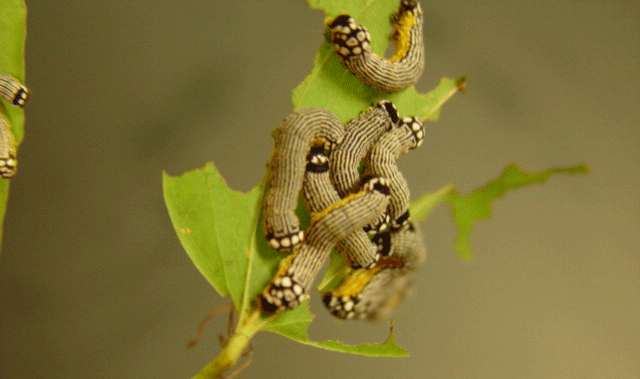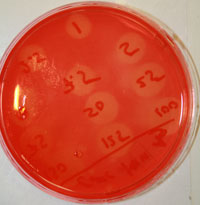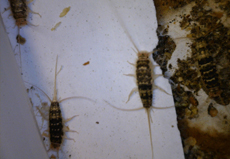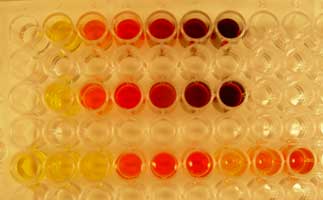| Identification of insect cellulases | |||
Funded by This material is based upon work supported by the National Science Foundation under Grant Number 1456662 |
|||
Why insect cellulases?Insects are very effective at degrading and assimilating plant biomass, which is mostly composed of cellulose. This ability to digest cellulose in insects was thought to be due to symbiotic microbes in their gut. However, we now know that endogenous cellulase genes are expressed by gut cells and theese enzymes display unique properties because they have evolved to function in a very restrictive environment: the insect digestive system. Our project is aimed at characterizing how insects are able to efficiently break down cellulose into glucose, and identifying the genes and proteins involved. |
|||
 |
|||
| Insect cellulases for improved digestion | |||
This project is part of our longer term goal of identifying and using novel enzymes to improve digestion of plant biomass by livestock and during production of ethanol biofuel from plant biomass. Major goals of this project include: |
|||
1.-Document the diversity of plant cell wall degrading enzyme genes in selected insect species. Genomic and transcriptomic resources identify genes involved in highly effective lignocellulolytic systems of selected insect species. Enzymes of interest are cloned and expressed in heterologous systems for characterization of enzymatic activity. |
|||
2.-Explore how physical organization of the digestive system works synergistically with the enzymes produced by the insect gut and/or symbionts present in the gut. Histology combined with biochemical quantitative determination of cellulolytic activity and transcriptome data identifies relevant genes and their localized expression in the digestive system of selected insect species. Information from this goal allows us to understand the functional organization of the digestive system that results in high levels of lignocellulolytic activity. |
|||
 |
 |
 |
|
| Publications from this area of research | |||
| Raza, A., Pothula, R., Abdelgaffar, H., Bashir, S., and J. L. Jurat-Fuentes (2020) "Identification and functional characterization of a β-glucosidase from Bacillus tequelensis BD69 expressed in bacterial and yeast heterologous systems" PeerJ 8: e8792. PDF | |||
| Pothula, R., Shirley, D., Perera, O. P., Klingeman, W. E., Oppert, C., Abdelgaffar, H. M.Y., Johnson, B. R., and J. L. Jurat-Fuentes (2019) "The digestive system in Zygentoma as and insect model for high cellulase activity" PLoS One 14(2):e0212505. PDF | |||
Shirley, D., Oppert, C., Reynolds, T. B., Miracle, B., Oppert, B., Klingeman, W. E., and J. L. Jurat-Fuentes (2014) "Expression of an endoglucanase from Tribolium castaneum (TcEG1) in Saccharomyces cerevisiae" Insect Sci. 21(5): 609-618. PDF |
|||
Willis, J. D., Oppert, B., Oppert, C., Klingeman, W. E., and J. L. Jurat-Fuentes (2011) “Cloning, expression, and characterization of a GHF9 cellulase from Tribolium castaneum (Coleoptera: Tenebrionidae)” J. Insect Physiol. 57(2): 300-306. PDF |
|||
Willis, J.D., Oppert, C., and J. L. Jurat-Fuentes (2010) "Characterization of cellulolytic activity from digestive fluids of Dissosteira carolina (Orthoptera: Acrididae)" Comp. Biochem. Physiol. Part B Biochem. Mol. Biol. 157(3): 267-272 PDF |
|||
Willis, J.D., Oppert, C., and J. L. Jurat-Fuentes (2010) "Methods for discovery and characterization of cellulolytic enzymes from insects" Insect Sci. 17(3): 184-198 PDF |
|||
Oppert, C., Klingeman, W.E., Willis, J.D., Oppert, B., and J. L. Jurat-Fuentes (2010) "Prospecting for cellulolytic activity in insect digestive fluids" Comp. Biochem. Physiol. Part B, 155: 145-154 PDF |
|||
Dr. Juan Luis Jurat-Fuentes
Department of Entomology and Plant Pathology The University of Tennessee 2431 Joe Johnson Drive 205 Ellington Plant Sciences Building Knoxville, TN, 37996 Tel: (865) 974-5931 jurat@utk.edu |
|||

